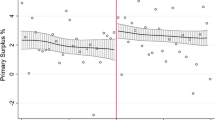Abstract
In this paper we develop the analysis ofthe effects on political fragmentation onfiscal policy in a number of ways. Weanalyze three kinds of fragmentation: sizeand control, institutional and over timefragmentation. In doing so we introduce anumber of new variables that allow us tolook at this issue in a broader way. At thesame time we have tackled somemethodological problems that affectedprevious analyses, using a panel of 19 OECDcountries over 1975–1995. Overall we findrelatively poor evidence in favor of sizeand over time fragmentation, and moreevidence of institutional and controlfragmentation.
Similar content being viewed by others
References
Alesina, A. and Drazen, A. (1991). Why are stabilizations delayed? A political economy model. American Economic Review 81: 1170–1188.
Arellano, M. and Bond, S.R. (1991). Some tests of specification for panel data: Monte Carlo evidence and an application to employment equations. Review of Economic Studies 58: 277–297.
Ashworth, J. and Heyndels, B. (2001). Political fragmentation and the evolution of national tax structures in the OECD. International Tax and Public Finance 8: 377–393.
Barro, R.J. (1979). On the determination of public debt. Journal of Political Economy 87: 940–971.
Beck, T., Clark, G., Groff, A., Keefer, P. and Walsh, P. (2000). New tools and tests in comparative political economy: The database of political institutions. World Bank Working Papers Series n. 2283.
Beck, T., Clark, G., Groff, A., Keefer, P. and Walsh, P. (2001). New tools in comparative political economy: The database of political institutions. World Bank Economic Review 15: 165–176.
Besley, T. and Case, A. (1995). Does electoral accountability affect economic policy choices? Evidence from gubernatorial term limits. Quarterly Journal of Economics 110: 769–798.
Borrelli, S.A. and Rayed, T.J. (1995). Government 'strength' and budget deficits in advanced democracies. European Journal of Political Research 28: 225–260.
Bun, M.J.M. and Kiviet, J.F. (1999). On the small sample accuracy of various inference procedures in dynamic panel data models. Mimeo. University of Amsterdam.
Edin, P.A. and Ohlsson, H. (1991). Political determinants of budget deficits: Coalition effects versus minority effects. European Economic Review 35: 1597–1603.
Grilli, V., Masciandaro, D. and Tabellini, G. (1991). Political and monetary institutions and public financial policies in the industrial countries. Economic Policy 13: 341–392.
de Haan, J. and Sturm J.E. (1994). Political and institutional determinants of fiscal policy in the European Community. Public Choice 80: 157–172.
de Haan, J. and Sturm, J.E. (1997). Political and economic determinants of budget deficits and of government spending: A reinvestigation. European Journal of Political Economy 13: 739–750.
de Haan, J., Sturm, J.E. and Beekhuis, G. (1999). The weak government thesis: Some new evidence. Public Choice 101: 163–176.
Hallerberg, M. and von Hagen, J. (1999). Electoral institutions, cabinet negotiations, and budget deficits in the European Union. In Poterba, J. and Von Hagen, J. (Eds.), Fiscal institutions and fiscal performance, 209–232. Chicago IL: University of Chicago Press.
Hamilton, A., Madison, J. and Jay, J. (1982). The federalist papers. New York: Bantam Books.
Judson, R.A. and Owen, A.L. (1999). Estimating dynamic panel data models: A guide to macroeconomists. Economics Letters 65: 9–15.
Kontopoulos, Y. and Perotti, R. (1999). Government fragmentation and fiscal policy outcomes: Evidence from OECD countries. In Poterba, J. and Von Hagen, J. (Eds.), Fiscal institutions and fiscal performance, 81–102: Chicago IL: University of Chicago Press.
Lijphart, A. (1984). Democracies: Patterns of majoritarian and consensus government in twenty-one countries. New Haven: Yale University Press.
Padovano, F. and Venturi, L. (2001). Wars of attrition in Italian government coalitions and fiscal performance: 1948–1994. Public Choice 109: 15–54.
Perotti, R. and Kontopoulos, Y. (2002). Fragmented fiscal policy. Journal of Public Economics 86: 191–222.
Rogoff, K. and Sibert, A. (1988). Elections and macroeconomic policy cycles. Review of Economic Studies 55: 1–16.
Roubini, N. and Sachs, J. (1989). Political and economic determinants of budget deficits in the industrial economies. European Economic Review 33: 903–938.
Volkerink, B. and de Haan, J. (2001). Fragmented government effects on fiscal policy: New evidence. Public Choice 109: 221–242.
Author information
Authors and Affiliations
Rights and permissions
About this article
Cite this article
Ricciuti, R. Political Fragmentation and Fiscal Outcomes. Public Choice 118, 365–388 (2004). https://doi.org/10.1023/B:PUCH.0000019909.77676.85
Issue Date:
DOI: https://doi.org/10.1023/B:PUCH.0000019909.77676.85




